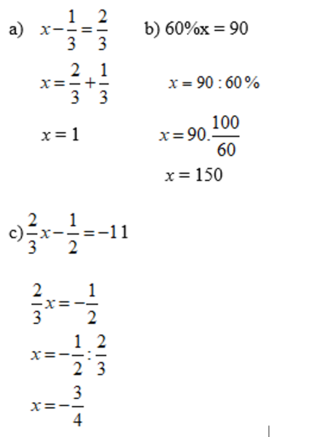Tìm x biết:
a ) x - 1 3 = 2 3
b) 60%x = 90
c) 2 3 x - 1 2 = - 1
Hãy nhập câu hỏi của bạn vào đây, nếu là tài khoản VIP, bạn sẽ được ưu tiên trả lời.



a) \(\dfrac{6}{13}:\left(\dfrac{1}{2}-x\right)=\dfrac{15}{39}\)
\(\dfrac{1}{2}-x=\dfrac{6}{13}:\dfrac{15}{39}\)
\(\dfrac{1}{2}-x=\dfrac{6}{5}\)
\(x=\dfrac{1}{2}-\dfrac{6}{5}\)
\(x=-\dfrac{7}{10}\)
b) \(3\times\left(\dfrac{x}{4}+\dfrac{x}{28}+\dfrac{x}{70}+\dfrac{x}{130}\right)=\dfrac{60}{13}\)
\(3\times x\times\left(\dfrac{1}{4}+\dfrac{1}{28}+\dfrac{1}{70}+\dfrac{1}{130}\right)=\dfrac{60}{13}\)
\(x\times\left(\dfrac{3}{1\times4}+\dfrac{3}{4\times7}+\dfrac{3}{7\times10}+\dfrac{3}{7\times13}\right)=\dfrac{60}{13}\)
\(x\times\left(1-\dfrac{1}{4}+\dfrac{1}{4}-\dfrac{1}{7}+\dfrac{1}{7}-\dfrac{1}{10}+\dfrac{1}{10}-\dfrac{1}{13}\right)=\dfrac{60}{13}\)
\(x\times\left(1-\dfrac{1}{13}\right)=\dfrac{60}{13}\)
\(x\times\dfrac{12}{13}=\dfrac{60}{13}\)
\(x=\dfrac{60}{13}:\dfrac{12}{13}\)
\(x=5\)

Bài 1:
Ta có: \(4-2\left(x+1\right)=2\)
\(\Leftrightarrow2\left(x+1\right)=2\)
\(\Leftrightarrow x+1=1\)
hay x=0
Bài 2:
Ta có: \(\left|2x-3\right|-1=2\)
\(\Leftrightarrow\left|2x-3\right|=3\)
\(\Leftrightarrow\left[{}\begin{matrix}2x-3=3\\2x-3=-3\end{matrix}\right.\Leftrightarrow\left[{}\begin{matrix}2x=6\\2x=0\end{matrix}\right.\Leftrightarrow\left[{}\begin{matrix}x=3\\x=0\end{matrix}\right.\)

a) Ta có: \(\dfrac{1}{7}+x=-\dfrac{2}{3}\)
\(\Leftrightarrow x=-\dfrac{2}{3}-\dfrac{1}{7}=\dfrac{-14}{21}-\dfrac{3}{21}\)
hay \(x=-\dfrac{17}{21}\)
Vậy: \(x=-\dfrac{17}{21}\)
b) Ta có: \(\dfrac{-2}{3}:x=\dfrac{-5}{6}\)
\(\Leftrightarrow x=\dfrac{-2}{3}:\dfrac{-5}{6}=\dfrac{-2}{3}\cdot\dfrac{6}{-5}=\dfrac{-12}{-15}=\dfrac{4}{5}\)
Vậy: \(x=\dfrac{4}{5}\)
c) Ta có: \(\left(\dfrac{3}{5}-2x\right)\cdot\dfrac{5}{8}=1\)
\(\Leftrightarrow\left(\dfrac{3}{5}-2x\right)=1:\dfrac{5}{8}=\dfrac{8}{5}\)
\(\Leftrightarrow-2x=\dfrac{8}{5}-\dfrac{3}{5}=1\)
hay \(x=-\dfrac{1}{2}\)
Vậy: \(x=-\dfrac{1}{2}\)
d) Ta có: \(\dfrac{3}{4}+\dfrac{2}{5}x=\dfrac{29}{60}\)
\(\Leftrightarrow x\cdot\dfrac{2}{5}=\dfrac{29}{60}-\dfrac{3}{4}=\dfrac{29}{60}-\dfrac{45}{60}=\dfrac{-16}{60}=\dfrac{-4}{15}\)
hay \(x=\dfrac{-4}{15}:\dfrac{2}{5}=\dfrac{-4}{15}\cdot\dfrac{5}{2}=\dfrac{-20}{30}=-\dfrac{2}{3}\)
Vậy: \(x=-\dfrac{2}{3}\)
e) Ta có: \(\dfrac{3}{4}+\dfrac{1}{4}:x=\dfrac{2}{5}\)
\(\Leftrightarrow\dfrac{1}{4}:x=\dfrac{2}{5}-\dfrac{3}{4}=\dfrac{8}{20}-\dfrac{15}{20}=\dfrac{-7}{20}\)
hay \(x=-\dfrac{1}{4}:\dfrac{7}{20}=\dfrac{-1}{4}\cdot\dfrac{20}{7}=\dfrac{-20}{28}=\dfrac{-5}{7}\)
Vậy: \(x=-\dfrac{5}{7}\)
f) Ta có: \(\dfrac{11}{12}-\left(\dfrac{2}{5}+x\right)=\dfrac{2}{3}\)
\(\Leftrightarrow-x+\dfrac{11}{12}-\dfrac{2}{5}-\dfrac{2}{3}=0\)
\(\Leftrightarrow-x+\dfrac{55}{60}-\dfrac{24}{60}-\dfrac{40}{60}=0\)
\(\Leftrightarrow-x-\dfrac{9}{60}=0\)
\(\Leftrightarrow-x=\dfrac{9}{60}=\dfrac{3}{20}\)
hay \(x=-\dfrac{3}{20}\)
Vậy: \(x=-\dfrac{3}{20}\)
g) Ta có: \(\left|x+\dfrac{1}{3}\right|-4=\dfrac{-1}{2}\)
\(\Leftrightarrow\left|x+\dfrac{1}{3}\right|=\dfrac{-1}{2}+4=\dfrac{-1}{2}+\dfrac{8}{2}=\dfrac{7}{2}\)
\(\Leftrightarrow\left[{}\begin{matrix}x+\dfrac{1}{3}=\dfrac{7}{2}\\x+\dfrac{1}{3}=-\dfrac{7}{2}\end{matrix}\right.\Leftrightarrow\left[{}\begin{matrix}x=\dfrac{7}{2}-\dfrac{1}{3}=\dfrac{21}{6}-\dfrac{2}{6}=\dfrac{19}{6}\\x=-\dfrac{7}{2}-\dfrac{1}{3}=\dfrac{-21}{6}-\dfrac{2}{6}=\dfrac{-23}{6}\end{matrix}\right.\)
Vậy: \(x\in\left\{\dfrac{19}{6};-\dfrac{23}{6}\right\}\)

a) \(\left(x-3\right)\left(x^2+3x+9\right)+x\left(x+2\right)\left(2-x\right)=1\)
\(\Leftrightarrow x^3-27+x\left(4-x^2\right)=1\)
\(\Leftrightarrow x^3-27+4x-x^3=1\)
\(\Leftrightarrow4x-27=1\Leftrightarrow4x=28\Leftrightarrow x=7\)
b) \(\left(x-2\right)^3-\left(x-2\right)\left(x^2+2x+4\right)+6\left(x-2\right)\left(x+2\right)=60\)
\(\Leftrightarrow x^3-6x^2+12x+4-x^3-8+6\left(x^2-4\right)=60\)
\(\Leftrightarrow-6x^2+12x-4+6x^2-24=60\)
\(\Leftrightarrow12x-28=60\Leftrightarrow x=\frac{22}{3}\)
a) (x - 3)(x^2 + 3x + 9) + x(x + 2)(2 - x) = 1
x^3 + 3x^2 + 9x - 3x^2 - 9x - 27 + 2x^2 - x^3 + 4x - 2x^2 = 1
4x - 27 = 1
4x = 28
x = 7
b) (x - 2)^3 - (x - 2)(x^2 + 2x + 4) + 6(x - 2)(x + 2) = 60
x^3 - 4x^2 + 4x - 2x^2 + 8x - 8 - x(x^2 + 2x + 4) + 2(x^2 + 2x + 4) + 6x - 24 = 60
x^3 + 12x - 32 - x^2 - 2x^2 - 4x + 2x^2 + 4x + 8 = 60
12x - 24 = 60
12x = 60 + 24
12x = 84
x = 7

Ta có \(x+5⋮x+2\)
=> x + 2 + 3 \(⋮\)x + 2
Vì x + 2 \(⋮\)x + 2
=> 3 \(⋮\)x + 2
=> x + 2 \(\in\)Ư(3)
=> x + 2 \(\in\) {1 ; 3 - 1 ; - 3}
=> x \(\in\){-1 ; 1 ; - 3 ; - 5}
b) (x - 2)(x + 3) = 0
\(\orbr{\begin{cases}x-2=0\\x+3=0\end{cases}}\Rightarrow\orbr{\begin{cases}x=2\\x=-3\end{cases}}\)
=> x \(\in\){2 ; - 3}
c) (2x + 60)(9 - x2) = 0
=> \(\orbr{\begin{cases}2x+60=0\\9-x^2=0\end{cases}}\Rightarrow\orbr{\begin{cases}x=-30\\x=\pm3\end{cases}}\)
=> x \(\in\){- 30 ; 3 ; - 3}
d) Vì \(x;y\inℤ\Rightarrow\hept{\begin{cases}x-2\inℤ\\y+1\inℤ\end{cases}}\)
Ta có 3 = 1.3 = (-1).(-3)
Lập bảng xét các trường hợp
| x - 2 | 1 | - 1 | 3 | - 3 |
| y + 1 | 3 | - 3 | 1 | - 1 |
| x | 3 | 1 | 5 | -1 |
| y | 2 | -4 | 0 | -2 |
Vậy các cặp số (x ; y) thỏa mãn là (3 ; 2) ; (1 ; - 4) ; (5 ; 0) ; (- 1; - 2)

a, 720:[118-(2x -10) ]=60
[118-(2x-10)]=720:60
118-(2x-10)=12
2x-10=118-12
2x-10=106
2x =106+10
2x =116
x=116:2
x=58

Bài 1:a) \(\left(x-3\right)^3=x^3-9x^2+27x-27\)
b)\(\left(\frac{1}{5}x-1\right)\left(\frac{1}{5}x+1\right)=\frac{1}{25}x^2-1\)
Bài 3:
a)x(x-6) + 10x - 60 =0
\(\Rightarrow x^2-6x+10x-60=0\)
\(\Rightarrow x^2+4x+60=0\)
\(\Rightarrow\left(x+2\right)^2+54=0\)
Vì \(\left(x+2\right)^2+54\ge54\forall x\)
\(\Rightarrow\)không có giá trị nào của x thỏa mãn.